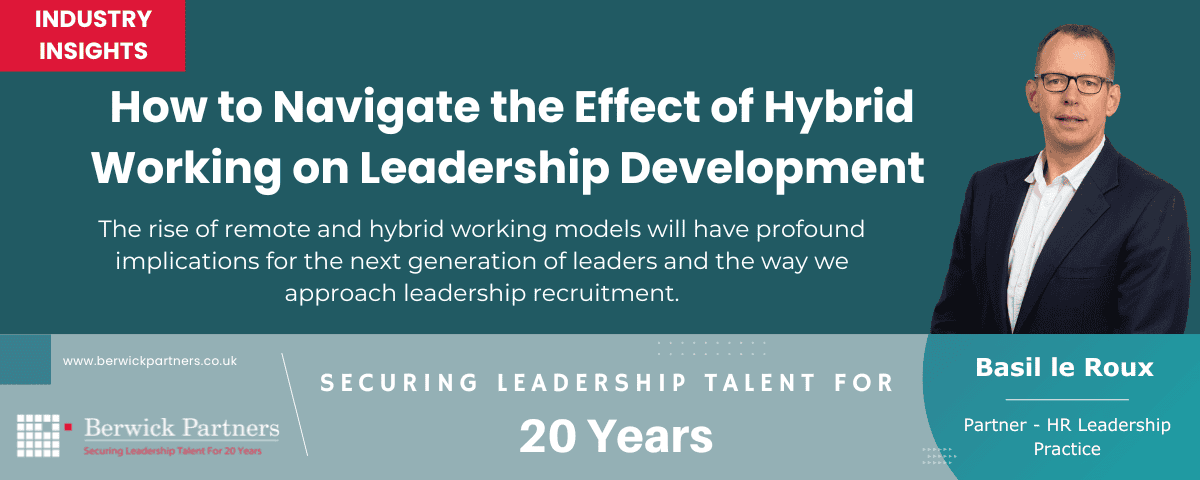Behavioural Economics: You are not as rational as you think
The theory that humans are not rational creatures was proven back in the 1970s. Humans have ‘cognitive biases’, showing that that we systematically make choices that defy clear logic. Basil leRoux, Partner and Head of the Human Resources practice at Berwick Partners, discusses the concept of behavioural economics and the impact this can have on business leaders.
I recently came across one of my old ‘A’ level economics books. It strongly pushed the view that people are rational, which came as a bit of a shock to me. Having worked in recruitment for 20 years, I am firmly of the belief that people are not rational; We all have emotions and biases and they present themselves in a variety of ways.
Behavioural economics has challenged the view we are rational decision makers. The discipline grew out of the work done by Daniel Kaneman and Amos Tversky (now deceased), who applied personality and social psychology to economics. Their work saw them being awarded the Nobel Prize for Economics in 2002, despite them not being economists.
Behavioural economics has entered into day to day conversations through books such as Freakonomics, Nudge, Thinking, Fast and Slow and the creation of the Behavioural Insights Team in the UK Civil Service. An example of their work was the default opt-in for pensions, which was introduced in 2012. Since coming into effect there has been a nearly 200% increase in the number of private sector pension schemes.
Yet, despite the body of evidence that people are not rational or consistent in their decision making, it is frequently overlooked as a factor when companies are managing change or designing incentives and ways of working.
Five common biases to be aware of in business:
1. Social Proof: when feeling uncertain, we look to our friends and colleagues for how to behave, what we should think and what we should do. This is known as “social proof”. It can be an issue when someone new joins a team and the existing employees’ assessment of the individual is based more on their colleagues’ views and perceptions. It is also part of the reason why diverse boards are a good thing – they reduce “group think”.
2. Anchoring: When we make decisions, we have a tendency to focus on one piece of information as our reference point and there is a bias towards that value. It is why in a negotiation you should go first as the number you choose sets the anchor or starting point. It also means when you interview a candidate you should avoid sharing your feedback with your colleagues until others have met with that individual. If you share your thoughts prior to them meeting them, you run the risk of inadvertently anchoring the other interviewers’ perceptions.
3. Status Quo: in a world of ever increasing change and disruption it is easy to forget the value that people place on the “status quo”. It means that even though a change may benefit an individual or group they may still reject it, as they place greater value on that which they already have. This is a reason why the BREXIT vote came as such a shock; most referendums favour the status quo.
4. Loss Aversion: people are loss averse and consequently they place a greater value on something being taken away from them than in gaining. The effects of change are not normally neutral and, typically, it is the losers from this that are most vocal, even when the effects are positive.
5. Over-confidence: there is a classic study that found 93% of drivers rate themselves as better than the average, which is statistically impossible. Leaders need to be mindful of over-confidence in themselves and in their teams. It can result in over-ambitious timescales, unrealistic forecasts and projects with unachievable aims.
Over the last 20 years, there have been huge advances made in in our knowledge and understanding of human psychology, our decision-making processes and how our unconscious biases affect these. Yet from both my own personal experience of leadership and development programmes I have attended, interviewing candidates at large and the UK’s poor productivity record in part a result of the “accidental manager”, these advances are ignored. The advances of A&I and automation meaning machines will take on much of what is considered repetitious and mundane work, those managing knowledge based workers are going to need to become much more aware of human imperfections if they are to get the best out of themselves and their teams.
For more information, please contact Basil leRoux, Partner and Head of the Human Resources practice at Berwick Partners.






